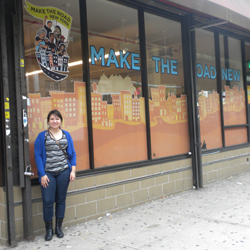Field Study
Full Time Field Study
The Community Studies Program takes pride in the experiential education component of our major, through which you can both contribute to and learn from organizations that are actively working for social change in a variety of fields.

With the guidance of faculty and staff advisers, community studies students choose field placements related to one of the program’s areas of focus in health justice and economic justice. In the past, placements have been arranged with community health clinics, women’s and feminist organizations, immigrant-rights centers, media advocacy organizations, homeless resource and support groups, sustainable development projects, queer and transgender organizations, neighborhood or workers’ collectives, civil rights groups, community food security programs, legal clinics, community-based cultural organizations, programs for seniors, tenant or labor unions, HIV/AIDS advocacy groups, harm reduction programs, government agencies and the offices of elected officials, and still other organizations committed to and working for social justice. As political, economic, cultural and technological landscapes shift, so do the needs and opportunities for social justice organizing. It is a dynamic world and throughout its history Community Studies has been noteworthy for being attuned and responsive to innovative field study opportunities.
Possible locations are, but are not limited to:
- San Francisco
- Detroit
- Portland
- Seattle
- Los Angeles
- Memphis
- New Orleans
- Chicago
- Guatemala
- New York City
**One Student's Field Study Experience**
Chiara Cabiglio worked with the Darfur Peace and Development Organization in Washington, D.C.; she writes:
Darfur Peace and Development Organization (DPDO) is a non-profit that provides humanitarian and development assistance to the victims of genocide in Darfur, Sudan. The organization is recreating the co-dependent ecology that once existed in Darfur by educating the youth, empowering and protecting the women, and engaging in grassroots peace-building.
Since only three full-time employees (who need all the help they can receive) work in DPDO’s Washington D.C. office, I virtually did everything and anything. Some of these tasks included: searching for upcoming Senate/House of Representatives hearings, outreach and social networking through Facebook, Twitter, etc., writing and sending press releases, writing articles and posting them with pictures to our website, contacting Congressmen, celebrities, organizations and newspapers, assisting with research for the completion of grant proposals, searching for grant making foundations, emailing email inquiries, sending proposals, and much, much more. Most notably, I was given permission to create and organize an event entirely on my own, which I called “Dara for Unity and Hope.”
During my time in D.C. I also attended the Pledge 2 Protect conference and marched on Capitol Hill with more than 1,000 students, calling on Congress to prevent genocide and mass atrocities in Darfur, southern Sudan, the Congo, Burma, and elsewhere.
Working with DPDO exceeded my expectations because I learned how important humanitarian work is in addition to advocacy. I also was able to work alongside the Founder and President of DPDO, Suliman Giddo, who is from Darfur. Hearing his stories and seeing how hard he works every single day for his people truly was inspiring. For more information, please visit https://www.darfurpeace.org/.
